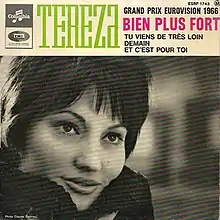Bien plus fort
"Bien plus fort" (English translation: "Much Stronger") was the Monegasque entry in the Eurovision Song Contest 1966, performed in French by Croatian singer Téréza, the first non-French artist to represent the principality in the Contest.
 | |
| Eurovision Song Contest 1966 entry | |
| Country | |
| Artist(s) | |
| As | Téréza |
| Language | |
| Composer(s) | Gérard Bourgeois |
| Lyricist(s) | Jean-Max Rivière |
| Conductor | |
| Finals performance | |
| Final result | 17th |
| Final points | 0 |
| Entry chronology | |
| ◄ "Va dire à l'amour" (1965) | |
| "Boum-Badaboum" (1967) ► | |
The song is in the chanson style, popular in the early years of the Contest. Téréza tells her lover that "your love for me" and "my love for you" are variously "stronger than the wind", "bigger than the earth" and various other superlatives, as well as asking him to take her away from where she is currently.
"Bien plus fort" was performed thirteenth on the night, following Switzerland's Madeleine Pascal with "Ne vois-tu pas?" and preceding Italy's Domenico Modugno with "Dio, come ti amo". At the close of voting, it had received the dreaded nul points, placing 17th (equal last) in a field of 18.
A Croatian version of the song was also recorded, "Još mnogo jače", as Téréza herself was in fact from that part of what was then Yugoslavia and she also recorded an Italian version, "Piu di ogni cosa". She would also go on to represent her homeland Yugoslavia at the 1972 Contest, singing "Muzika i ti", then under her full name Tereza Kesovija.
The song was succeeded as Monegasque representative at the 1967 Contest by Minouche Barelli with "Boum-Badaboum".
Sources and external links
References